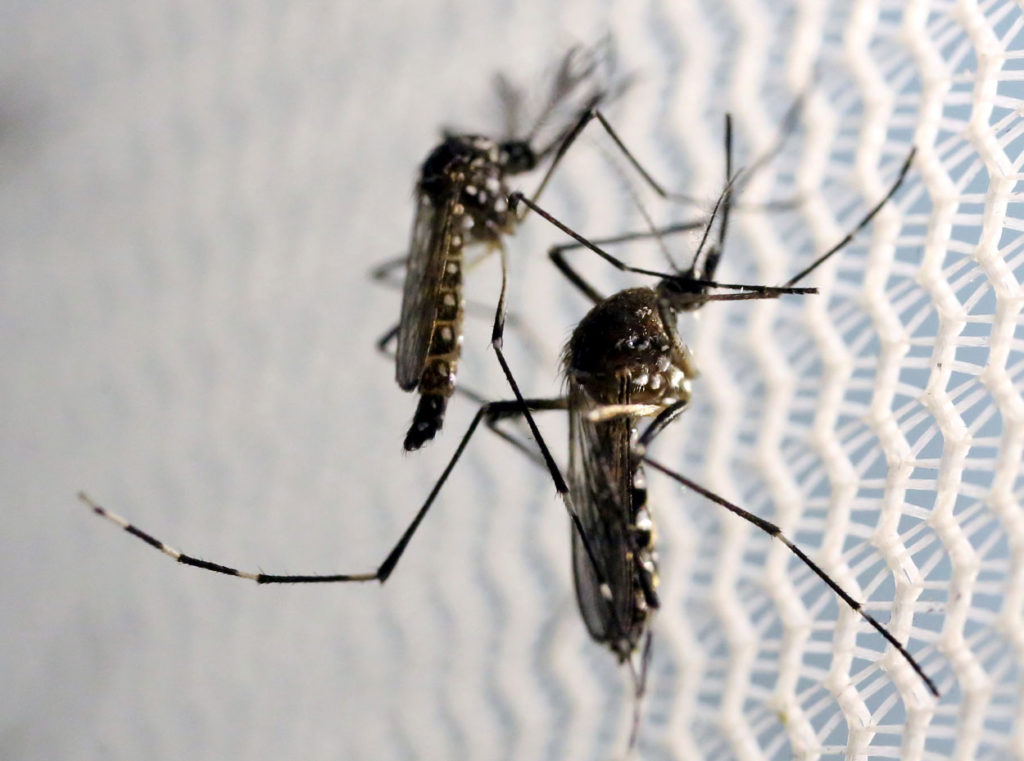As the number of Zika virus cases in the United States continues to rise, residents in South Florida are in a unique position to become the testing ground for a promising new experiment that could dramatically reduce the number of Zika-infected mosquitoes.
But due to concerns that the proposal to release millions of genetically modified mosquitoes into the environment could permanently alter the Earth’s ecosystem, a “vocal minority” is doing everything in its power to stop it.
“We don’t think it’s ethical to be altering life forms in this way and then releasing them out into the wild,” said Zen Honeycutt, director of the group Moms Across America, whose mission is to raise awareness about genetically modified organisms and toxic exposure.
Moms Across America is one of several grassroots organizations protesting the release of genetically modified male mosquitoes in Key Haven, Florida, that carry a self-limiting gene that prevents them from reaching adulthood. The mosquitoes, developed by the British biotechnology company Oxitec, Ltd., reduced the number of Zika-infected mosquitoes by over 90 percent in trials conducted in the Cayman Islands, Panama, and Brazil.
The use of genetically modified mosquitoes in the U.S. requires a long, arduous approval process, and the timing of Oxitec’s proposal in Southern Florida is somewhat coincidental.
In 2009 through 2010, the Florida Keys experienced an outbreak of the dengue virus, which stems from the Aedes aegypti mosquito—the same mosquito that carries the Zika virus. In an attempt to have another method of fighting the Aedes aegypti mosquito, the executive director of the Florida Keys Mosquito Control District approached Oxitec back during the dengue outbreak about doing a trial that involves releasing its self-limiting mosquitoes.
The Florida Keys Mosquito Control District is one of 61 mosquito control districts in the state, and is comprised of five elected commissioners. Those commissioners can impose a percentage of property taxes on Monroe County residents, which encompasses the Florida Keys, to carry out their mandate of controlling the mosquito population.
Six years after the dengue outbreak, the Florida Keys Mosquito Control District is now attempting to contain the spread of the Zika virus, which the Centers for Disease Control and Prevention estimates has been locally transmitted in 50 countries, including the U.S. All of the six locally-acquired mosquito-borne Zika cases in the U.S. originated in Florida.

An 8-day-old baby in Choluteca, Honduras, was born with microcephaly caused by the Zika virus. (Photo: Reuters/Jorge Cabrera/Newscom).
Already, signs have flooded the Florida Keys urging residents to oppose the Oxitec trial. According to the Miami Herald, key opposition groups targeted a Florida Keys Mosquito Control Board meeting on Tuesday afternoon.
Beth Ranson, a spokeswoman for the Florida Keys Mosquito Control District, told The Daily Signal that it’s because of this “vocal minority” that the Mosquito Control District decided it would hold a nonbinding referendum on Nov. 8 to see where residents stand.
Both Key Haven residents and the larger Monroe County will have a say, but the Florida Keys Mosquito Control District has no obligation to abide by the outcomes of those ballots.
Ultimately, the decision about whether to move forward with the Oxitec trial rides on the Florida Keys Mosquito Control District’s five commissioners, whose previous statements on the issue suggest they’re interested in moving forward.
“They can’t release any mosquitoes or do any mosquito-based trial down here without our authority,” Ranson said.

Aedes aegypti mosquitoes are seen inside an Oxitec laboratory in Campinas, Brazil. (Photo: Reuters/Paulo Whitaker/File Photo/Newscom)
Mosquito control experts beyond Florida appear generally supportive of the Oxitec proposal, so long as the program is integrated with other forms of mosquito control management.
“What they want to do makes eminent sense,” Joe Conlon, technical adviser for the American Mosquito Control Association, told The Daily Signal. “They’re releasing male mosquitoes that don’t bite. And [Oxitec] is not touting this as the silver bullet for Aedes aegypti control—they’re saying that this could be part of an integrated mosquito management program, which I totally agree with.”
Other forms of mosquito control include spraying pesticides and taking basic precautions such as wearing protective clothing and insect repellent, getting rid of outside containers that could collect water, and having window screens and air conditioner.
But with Zika now in U.S. territory and still no cure in sight, the public is looking for more.
‘We’re Dealing With Changing the Gene Pool’
Despite the U.S. Food and Drug Administration giving Oxitec its stamp of approval to conduct a test in Key Haven, some residents and activist groups say they’re still concerned about the environmental and health impacts the mosquitoes could cause.
“Because we’re dealing with changing the gene pool, the rule of thumb should be to be as cautious as possible and to extinguish all doubts, because any problem could potentially be multiplied millions of times, and in all future generations. And that’s not an exaggeration,” said Jeffrey M. Smith of the Institute for Responsible Technology, which advocates against genetically modified organisms.
With Oxitec, he said, “we’ve seen the exact opposite.”
The Daily Signal sought comment from Oxitec, which did not immediately reply.

Workers in Miami work diligently to clean the sewer systems as part of efforts to stop the spread of the Zika virus. (Photo: EPA/Cristobal/Herrera/Newscom)
The Daily Signal also sought comment from the FDA, which is regulating the Oxitec mosquito in consultation with the Centers for Disease Control and Prevention and the U.S. Environmental Protection Agency. Juli Putman, a spokeswoman for the agency said the risks involved with the trial are “negligible or low.”
“The FDA has published a finding of no significant impact (FONSI) agreeing with the environmental assessment’s conclusion that the proposed field trial will not have significant impacts on the environment,” Putman said. “Based on the data and information submitted by Oxitec, Ltd., and in scientific literature, the FDA’s FONSI concludes that the risk of significant impacts on human or other animals from conducting the proposed field trial is negligible or low.”
But the FDA’s findings don’t begin to quell Smith’s concerns, he said, which involve everything from the direct impacts of releasing genetically modifying mosquitoes—what could happen to their saliva, for example—to the indirect consequences for the environment.
“The technology is potentially more dangerous than Zika,” Smith said. “We’re dealing with a tremendous about of unknowns.”
Smith would not go into detail about how his organization and its allies plan to protest the trial in Key Haven, but said he’s doing everything in his power to stop it. Honeycutt of the group Moms Across America said she’s working with moms in the Florida area to raise awareness by “writing letters, contacting their legislators, and talking to local officials.”
‘Bent Out of Shape’
The Zika virus is spread by mosquitoes, but can also be transmitted sexually and passed on from a pregnant mother to her baby. In infants, the virus is known to result in microcephaly, which causes a baby’s head to be unusually small and its brain to be underdeveloped. With Zika’s ability to cause permanent birth defects in the children of pregnant women, women’s health care workers say they’re being inundated with phone calls from women seeking more information about how to protect themselves.
But Honeycutt told The Daily Signal that expecting mothers “should be more concerned about the chemicals that companies are spraying from the sky, like larvicides, pesticides, and insecticides,” than being bitten by a Zika-infected mosquito.
“The chemicals have more impact on fetuses than Zika virus has shown to,” she said.

Maggie Arias, a Miami resident who is 23 weeks pregnant with her first baby, says she is concerned about the Zika outbreak in her community. (Photo: Emily Michot/Miami Herald/TNS/Newscom)
Dr. Mark Whiteside, medical director at the Monroe County Department of Health, isn’t losing sleep over the health and environmental fears being launched by activists’ groups like Moms Across America. What concerns him, he said, is how the Key Haven community is “in an obsession” over the Oxitec trial.
“This isn’t going to help you now,” Whiteside warned. “If you think [protecting yourself] is someone else’s job, that’s not a good thing.”
Even if the Oxitec trial were approved tomorrow, “it would take about a month for Oxitec to get ramped up to do the release, then it would take approximately six months to see any results,” Ranson, of the Florida Keys Mosquito Control District, said.
Holding it up to November, Ranson added, “probably isn’t going to make that big of a difference,” given the summer mosquito season is already passing.
Conlon of the American Mosquito Control Association doesn’t disagree, but said the activists “bent out of shape” over the health and environmental impacts of genetically modified mosquitoes could cause more harm than good.
“Mosquito control is a lot more complex than people think it is,” he said, stressing the need to support companies like Oxitec that are “working outside the box” to find solutions.
“If the anti-GMO groups continue to fight against the Oxitec plan and others like it, they’re going to expose more people to Zika virus,” Conlon said. “Whether that’s going to translate into more cases, it’s hard to tell. But there will definitely be more exposure.”






























